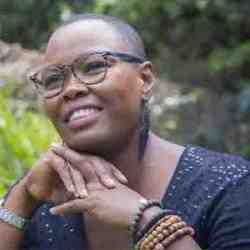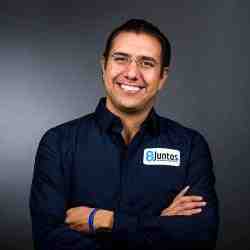Introduction
To deeply change the way in which we design care processes for patients suffering from neurological disorders, Hélène is developing an integrative highly tailorable non-drug approach that directly involves the closest caregivers of the patient. She improves the quality of life of both the patients and their environment by leveraging scientific research and changing the mindsets throughout the health ecosystem about patient care and non-drug approaches.
The New Idea
To permanently improve the quality of life of patients suffering from developmental, degenerative or post-traumatic neurological disorders, Hélène has designed a new approach that uplifts the potential of each patient. In doing so, she is breaking with a popular pathology-centric approach of care that often leads to the categorization of all severely disabled patients as hopeless cases. Using the model of equine therapy, her efficient care process takes into account the patient’s daily environment and provides the missing link allowing the closest caregivers (including health professionals and family members) to change their view on what the patient is capable of achieving, while simultaneously increasing the autonomy of the patient. To achieve this, her protocol directly involves caregivers in the therapeutic sessions, either through active participation or in a position of observation and learning.
Building on the advances in brain sciences and other related specialties, Hélène brings a professional and medical focus on the impact of holistic non-drug therapies. Within her specialized high-quality medical center, she leverages scientific research to prove that their use is truly efficient to bringing a disabled patient to his full potential. Hélène starts by establishing that strengthening the human-horse bond creates sustained neuroscientific recovery; based on this, she creates therapeutic opportunities for treating patients with neurological disorders in order to sustain and strengthen patient wellbeing.
Hélène engages a whole network of supporters through her approach in order to change the way these patients are considered at a very large scale. She does this by activating three powerful levers: first, she moves to change the mindsets of medical professionals, who prescribe the treatments, about non-drug approaches as complementary to existing therapies; secondly, she ensures financial accessibility of this care process by partnering with publicly funded medico-social institutions and private mutual insurance groups, with a longer term plan to provide the program through the national medical insurance system; and finally, she supports local entrepreneurs and organizations to replicate the work her center is doing in France and Europe by identifying the essential components to be used. Her next medical center is about to open at the heart of a university research park dedicated to Medicine.
The Problem
France has a traditional and well-anchored pathology-centered culture while teaching and practicing Medicine, in which treatment of the identified pathology takes precedence over the patient’s own potential to recover. As a result, non-drug responses are still limited, and are mostly unknown or unconsidered by the medical professionals when it comes to designing a medical treatment for a mentally disabled patient. Most of the patients with severe neurological disorders are housed in medico-social institutions that can hardly afford offering personalized care process to work on reaching increased autonomy and social inclusion. In 2011, in France, more than 10,000 patients who could have had access to an increased level of autonomy if provided with an alternative adapted care solution were instead hospitalized in psychiatric services.
What is more, the quality of the patient’s environment is rarely taken into consideration. As a consequence, the closest caregivers and the family of a mentally disabled patient have very few opportunities to learn how to deal better with the emotionally heavy situations they face every day. The sometimes very rough expression of the patient’s mental troubles put them under a constant pressure; often overwhelmed by the patient’s condition, they risk burn-out. The high frequency of absenteeism from work among medical caregivers in French society is an alarming indication of the collective burn-out being faced by the profession. This pressure often prevents them from seeing the full single potential of their patients and can make them feel they have no other choice but to adopt limitative practices with the patient, despite the impact on the patient’s quality of life and capacities.
However, there are several unprecedented opportunities for change. Medical research more and more focuses on alternative responses to all-drug treatments; more specifically, in neurosciences, the limits of all-pharmacological therapies and a deeper comprehension of the brain are opening a window for non-drug therapies. Moreover, the non-drug interventions have been recognized as a main innovation sector by the French state as part of the European Smart Specialization Strategy; thus implying that the funds from EU for regional development will be directed in priority to this sector, among 6 others. Finally, the regional public health authorities started to recommend the prescription of non-drug interventions in specific therapeutic contexts. The challenge is now to change the mindset of every medical professional regarding non-drug approaches, while being able to offer accessible and qualitative non-drug interventions.
The Strategy
In order to offer an effective response to the patients suffering from a variety of mental troubles, Hélène has designed a holistic non-drug care process that complements rather than replaces the patient’s current care treatment. Through her organization, Equiphoria, Hélène is working to change global perceptions on how the care for disabled patients should be handled, using the example of equine therapy.
Driven by a medical focus, and leaning on scientific research, Hélène has standardized high-quality diagnostic and treatment protocols using the human-horse bond. For instance, horses have to be selected and trained in a very specific way. In addition, Hélène selects the most extreme cases, for whom caregivers have had to adopt limitative practices (for example, using a restraint system to ensure patient security), leads rigorous clinical studies and partners with academic institutions to precisely track her therapy’s impact. To make this possible, Hélène developed with an engineer a unique equine simulator to take measures of the patient’s plasticity and record improvements after the horse-riding session.
To sustainably increase the patient’s autonomy, Hélène’s care process takes into consideration the persons closely associated to the patient’s personal and medical environment. To do so, Hélène systematically involves the closest (most frequent and consistent) caregivers or family members in the therapeutic sessions, thus providing them with the unique opportunity to observe and learn about the patient’s potential. The professional caregivers are empowered through a dedicated one-day training to actively participate in the sessions. This results in a new configuration that allows for the patient’s progression and a change of mindset within the patient’s closest environment. By impacting the caregivers’ mindset, Hélène provokes a ripple effect that reaches the extended medical network, including the socio-medical institutions. To track this impact on the daily environment of the patient, Hélène designed a study to be led independently on the socio-medical institutions.
To reach the greatest number of families and medical professionals, Hélène builds a network of therapy centers through a licensing model; this model is particularly consistent as it allows guaranteeing high-quality standards, absolutely necessary in the medical world, while allowing the specialization of each center in the treatment of specific pathologies. To achieve this, Hélène rigorously identified and designed the trainings, the detailed requirement specifications and procedures that need to be strictly followed when developing and managing an Equiphoria-labeled center. She is currently identifying the right local medical partners, among them Ashoka Fellows, to extend the network of centers.
To induce a broader mindset change toward patient care and make her approach really mainstream, Hélène engages a wide range of key players. She opens the medical professionals (prescribers) to her vision by activating two levers: first, she leverages her scientific results to communicate within the medical community; second, she contributes to change the way future medical professionals are taught: in Montpellier, she is strategically infiltrating the academic circles by implanting an Equiphoria center at the heart of a university research park dedicated to Medicine. But Hélène not only engages medical professionals through her approach but also public health agencies and private insurance companies who ensure the financial accessibility of her care process. The regional health authority already authorized the socio-medical institutions to use part of their public funds to provide Equiphoria’s therapeutic sessions to their patients. Today, 20+ publicly funded socio-medical institutions partners with Equiphoria, and Hélène already convinced one major French private insurance company to reimburse 100% of Equiphoria’s care process to its clients.
Hélène’s methodology being based on stimulating the intrinsic motivation of every single patient, making him an actor of his own treatment, it is possible to open the scope of the pathologies this care process can address. Looking to the future, Hélène is adapting her model to design a pilot-program that will provide care and improved wellbeing to women with breast cancer. She is also imagining financially leaner adaptations of her model to be created for developing countries and she has already identified the African diaspora population within France as a unique lever to expand her vision at an international level.
The Person
Hélène grew up in North and West Africa, where some personal reasons made her stop her studies of medicine to start her professional life very early. A real serial entrepreneur, Hélène set up several businesses, from opening of a modeling agency to settling an activity of personal coaching for at-risk populations.
While working in the United States to develop an international riding center, Hélène had a life-changing encounter with a local pastor-therapist who used to care for severely disabled people with horse-riding sessions. Deeply impressed by the spectacular results he could have on disabled people’s quality of life, Hélène decided to learn more about this kind of practices, and got trained. At that time, she discovered the limits of the existing solutions: the horse therapy, despite its huge potential of impact on health and quality of life, is still confined in the “horse world”, thus far from being recognized by the medical community and reimbursed by the medical insurance systems. In France, Hélène indeed took the time to make a personal on-field research that confirmed this kind of therapy crucially lacked of serious medical standards.
But Hélène saw in the horse therapy the opportunity of a breakthrough to revolutionize the disabled patient care; hence she decided to use her expertise to create her own therapy process, driven by a medical focus. France, with its deeply anchored pathology-centered approach on the handling of care for disabled patients, seemed to be a perfect place to start the work. She managed to gather several associations of medico-social institutions to become funding partners of the Equiphoria project and settled in Lozère, France. In addition, she convinced her husband to be her business partner and to use his skills in finance to care for the administrative and financial dimensions of Equiphoria. Settling this first therapy center has not been an easy way: just after the opening, the small team had to face a particularly cold winter that severely damaged the facilities they had just built. But Hélène showed a very high determination to succeed, a mental strength that she keeps expressing every day to make her voice heard about patient care.



